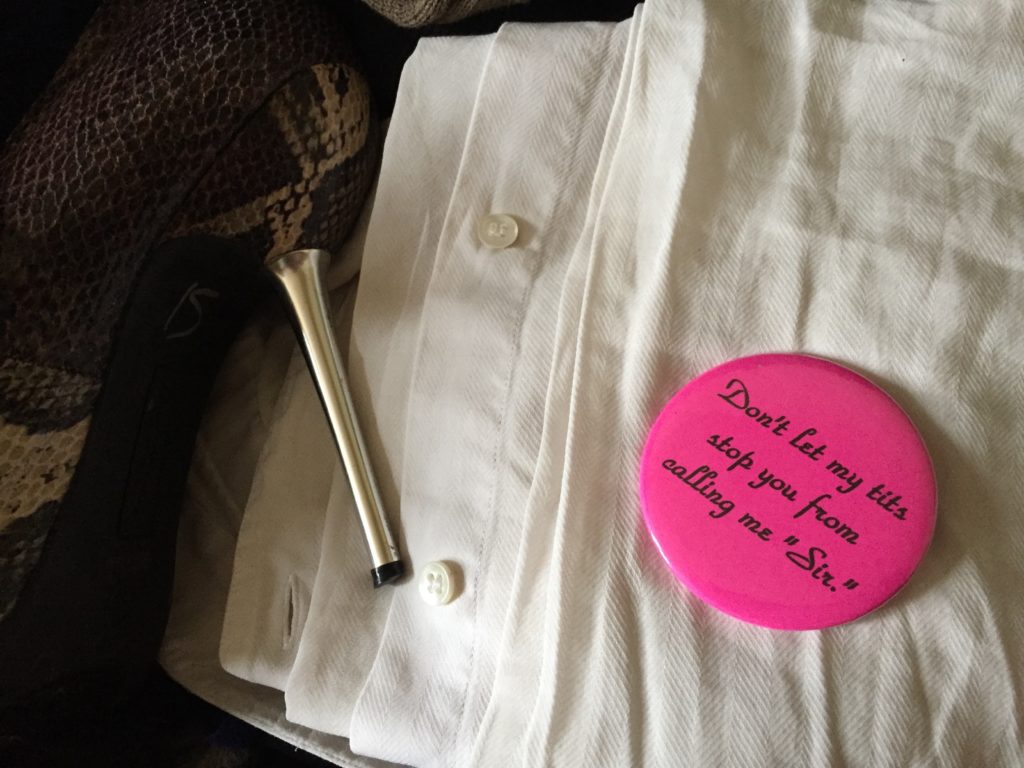I was recently asked what the difference between “kink” and “sex” are. It’s a good question, which people will vary wildly in their opinions about. Following is my take on the subject. I encourage others to disagree and to articulate for themselves differently than I do here — one of the most important things we get from talking about sexuality is an evolving and broadening scope of understanding about how things function differently for others. These varied articulations can, in turn, help us understand ourselves more deeply, or in new ways. I am all for that.
I will start by stating that “sexuality” is something separate from “sex”. Sexuality is a general blanket term which describes the factors surrounding how someone likes to (or does) get off, or feel turned on. Peoples sexualities can be identified (sexual identity) in multiple ways and within different categories such as: kinky, vanilla, queer, straight, gay, bi/pan/omnisexual, asexual, leather, fetishistic, Top/bottom/Versatile, D/s, switch, Sadistic, masochistic, hedonistic, primal, so on and so forth, etc… Sexualities evolve, grow, change, are discovered and rediscovered, and emerge throughout one’s life as one has new experiences, is exposed to new concepts, and generally learns more, and accepts or rejects more about what they find. One’s sexuality is influenced by one’s behaviors, though frequently sexual behavior and sexual identity do not go hand in hand (more on this later).
“Sex” is a word which encompasses a series of activities that one can engage in (or not), and which contribute to a person’s view of their sexuality. What is and is not (what “counts” for) sex is defined differently by different people. For the sake of ease I usually define sex as “anything ending in the word sex or job”. By this definition I would include sexual intercourse (PIV intercourse, genital or anal penetration with toys, all types of fingering, hand jobs, fisting, anal sex), also oral sex (cunnilingus, blow jobs, rimming), scissoring, frottage, masturbation, mutual masturbation, and generally anything which includes the rubbing, sucking, or licking of genitals for the intention of getting someone turned on and/or in an orgasmic state, to be “sex”.
Sex is not just about activities though. How we feel about the activities we engage in, and what we want to believe “counts” accounts for what people label as sex as well. “Energetic fucking” can be as much (if not moreso) sexually satisfying, sexy, and pleasurable as plain old vanilla intercourse is. So is energetic fucking sex? Some would say it is, others would say it is not. The same goes for a lot of activities including some of the ones I have labelled specifically as sex above.
Did you have sex if PIV intercourse only happened for a second with someone you wish you hadn’t hooked up with? What about if it was someone you desperately wanted to fuck? It turns out that we’ll label what counts and what doesn’t count as sex differently depending on how we felt about the situation. People often also say things to the effect of “we sorta kinda had sex not really” in situations where they feel grey about consummation. Is it sex if no one orgasms? What about if only one person involved in the equation does? I don’t believe there is any hard and fast rule to completely defining what is sex and what is not sex. There are a lot of “sexual activities” though, and some of them sometimes seem to count more than others to the general population. It is absolutely possible to believe you have had sex with someone who does not consider the time you spent together sex at all.
Moving in the direction of our next subject for definition, I personally would consider all of the activities I outlined above as examples of “vanilla sex”. I am sure a lot of people would consider at least some of them to be “kinky” though.
A “kink” is a bend or an irregularity in the system. What is kinky and what is not kinky resides entirely in the realm of speculation and personal definition too. The first question one must ask when deciphering whether an activity is “bent” must be: whose system are we evaluating for kinks? Fact: what’s kinky to you may be completely vanilla to me. Things that were defined as kinky to me in the past, may now be viewed as mainstream and vanilla as I’ve gained understanding or experience of the activity in a new way. For instance, consider activities such as spanking and oral sex. Some people consider both of these things to be kinky, some consider both of these things to be vanilla, and people also believe all the variables in between. There is no hard and fast definition about what’s kinky until a person who wants to define it for themselves does so as such. Lines in the sand, all.
What’s the point of defining something as vanilla or kinky to begin with? Well, I think like all perfectly imperfect language useage, it’s shorthand to find others who might be into what you’re into. We take a general idea (rather than our stringent personal definitions) of what’s “normal” behavior and label ourselves on one side of the divide in hopes to attract or repel people who we believe may identify similarly or differently than ourselves. The follow up questions are the important ones to anyone you wish to engage sexually or kinkliy with: ok, so you’re [vanilla/kinky], what types of things do you like to do? What feels good? What drives you wild? What should I do/not do to turn you on?
Now let’s revisit that idea from earlier about “Identity vs. Behavior”. Someone may not identify as kinky, but may also get really turned on by, let’s say… being tied up. Their behavior, when they decide to get turned on by going out and getting tied up a bunch, may be viewed by others as kinky. So is that person kinky? To much of their community, the answer may be yes. Does it matter? No. It matters to the person identifying the way they identify why they choose the identity they choose. Even if they are enjoying categorically “kinky” activities on the regular, if that person identifies as vanilla, they are vanilla. We don’t know all there is to know about that person or their reasons for choosing one identity over another. A person’s identity is their right to define as they choose for their own reasons in whatever moment they are sharing it with others. It’s important that we trust and respect people and their processes of uncovering and defining their own lives. This doesn’t mean we can’t ask questions or have a great conversation about how we view the definitions of these words differently, and we can also discuss the finer points of growing and discovering or rejecting new facets of identity over time. This also doesn’t mean we should deliberately hurt or mislead others by being opaque to the meaning of our behaviors and the expectations we set up when we use certain words exclusively to people we’re sharing our identities and sexualities with either… At the end of the day, we are all works in progress for better and for worse. We are all responsible for meaningful clarity and reasonable transparency about our interactions with others. We do not all agree about where these gray definitions land, hence the need for multiple ongoing conversations about our needs, wants, and expectations from the people we’re sexual and sensual with.
How you feel about these subjects is important. How you feel about them helps you figure out your own personal boundaries and articulate yourself more clearly than if you only thought in black and white dictionary definitions about what “should” or “shouldn’t” make you feel turned on, sexual, or sensual with another person. Also, as important as it is to respect people’s differences, community standards exist and account for some degree of safety and general information dissemination for reasons. The young person who believes oral or anal sex “isn’t sex” may be more vulnerable to STIs because they believe they are still “a virgin” and therefore invulnerable to the consequences of engaging in sexual activity. Here we see that differing community standards can contribute to education and/or potential harm through an unexamined ignorance of all the contributing factors which play into behavioral reality. Does it matter that you’re [gay/kinky/monogamous/heteroflexible…]? Only to the extent that responsible conversations with the people you are engaging with sexually/sensually/kinkily/romantically with are able to happen relatively transparently.
So go to it! It’s the most natural thing in the world to be turned on. Let’s talk about sexuality, sex, kink, behavior, and identity…
Play On My Friends,
~ Creature
Please support my work on Patreon. For one time donations click here: Support the Artist
~Thank you.


